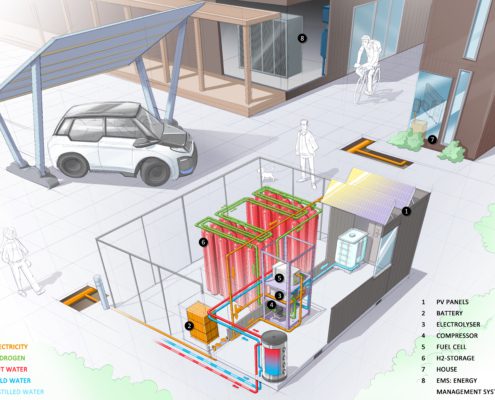TU Delft builds decarbonised energy system for the built environment
The energy transition will be felt most keenly in residential areas, where there are major challenges. Households will have to switch over from gas and the related increase in heat pumps and localised renewable energy systems is creating problems for the electricity grid. At The Green Village – the field lab for sustainable innovation on the TU Delft Campus – a unique project to accelerate the energy transition in the built environment will start on Friday 14 January: the 24/7 Energy Lab.
The idea behind it is simple, Marjan Kreijns (director of The Green Village) explains: ‘The 24/7 Energy Lab is a local decarbonised energy system, something that is urgently needed. After all, the built environment currently accounts for some 35% of the energy demand in the Netherlands. If we succeed in making this partially decarbonised, we will be taking a huge step forward in accelerating the energy transition.’
Building the future
A neighbourhood with a local energy system that doesn’t produce CO2 emissions or puts pressure on the national energy network: it may sound futuristic, but preparations are already in full swing at TU Delft Campus. Project leader John Schmitz says: ‘A large number of scientists at TU Delft are working on the energy transition. Their various research areas converge in the 24/7 Energy Lab. It’s a wonderful step that we are launching the 24/7 system on Friday 14 January. Shortly thereafter, we will have decarbonised the electricity supply of one household, using solar energy. Good to know: this concerns a one-person household with no natural gas connection and consuming around 2200 kWh per year. In a later phase, we will use the residual heat released by the system to heat up the other households on the campus site as well. In three years’ time, we want to supply all of The Green Village with locally generated energy from renewable sources. If that succeeds, we’d like to scale up to the size of a neighbourhood, or maybe even an entire district.’
Fewer restrictions and more qualified staff
A large-scale transition to energy-autonomous districts also requires the political system to get into gear. There are still plenty of legal restrictions, especially concerning the use of hydrogen. ‘Legislation on heating, electricity and gas is lagging behind the technology,’ says Kreijns. ‘There is a strong need for politicians in The Hague to provide more leeway when it comes to developing innovations.’
A significant lack of qualified staff is also looming. Furthermore, it is important that the new energy system is economically feasible and accepted by residents. Kreijns: ‘The Green Village holds a unique position as a living lab. There are currently twelve people living there, and their experience as consumers will be extremely valuable in developing a user-friendly system.’

The Electronic Management System (EMS) is set to play a key role in this project. The EMS will coordinate the different technological components. This kind of integrated system does not yet exist.
Technological challenge
The greatest technological challenge involves linking together all kinds of components and managing them. Electricity, gas and heat are now conducted along the streets separately, but that is set to change. A stable, sustainable energy system will require convergence between electricity, hydrogen and heat, with specific possibilities for buffering each of these. For example, you will need inverters to connect solar panels, which supply direct current, to a network of alternating current.
The Electronic Management System (EMS) is set to play a key role in this project. The EMS will coordinate the different technological components. It will take as many variables as possible into account, including the current weather, the weather forecast and the expected demand and supply. Schmitz: ‘The EMS must use intelligent algorithms to answer questions such as “Am I going to convert the energy generated into hydrogen now or should I charge the electric vehicle first?” Such an integrated system does not exist yet, but it is crucial to ensure that the reliability of a new, local, decarbonised energy system will soon match the reliability of the conventional system. The Netherlands is used to more than 99.9 per cent reliability of supply, we have to match that.’
TU Delft’s 180th anniversary
The TU Delft celebrates its 180th anniversary from 14 January 2022 onwards. To mark this occasion, the university wants to highlight its role in the energy transition.
The 24/7 Energy Lab is the second laboratory supporting the energy transition that TU Delft has opened in a short period of time. On 1 October 2021, the Electrical Sustainable Power Lab (ESP Lab) was inaugurated to prepare the electricity grid for the future. The great ambitions and challenges of the energy transition in the built environment all come together in the 24/7 Energy Lab. If it succeeds, every neighbourhood in the Netherlands will come to benefit from it.
More information
For questions regarding the 24/7 Energy Lab, please contact
- Marjan Kreijns, director The Green Village – M.S.Kreijns@tudelft.nl / 06 18635619
- John Schmitz, project leader 24/7 Energy Lab – J.E.J.Schmitz@tudelft.nl
- Dave Boomkens, TU Delft science information officer – D.J.Boomkens@tudelft.nl / 06 34081461







